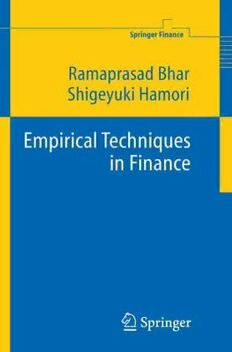
Empirical Techniques in Finance PDF
243 Pages·2005·6.711 MB·English
Most books are stored in the elastic cloud where traffic is expensive. For this reason, we have a limit on daily download.
Preview Empirical Techniques in Finance
Description:
Overall, this is a pretty light read and the mathematics is not too complicated. The treatment of each topic is standard and the examples provided by the authors are adequate. However, this book deviates from a standard textbook in that it does not provide you with many exercises, but the few exercises and examples that are provided seem adequate for purposes of being a reference on empirical techniques. Being a reference-type text, this book may not be suited for someone that is new to the field of empirical finance. Below is a more detailed analysis of the text.
I would classify the contents of this book into three categories. First, the book discusses standard financial econometric models, such as unit roots, ARCH, GARCH, vector autoregressive models, vector error correction models, and state space models. These topics are presented in a fairly standard econometric treatment. In addition, the authors describe their data sources, methods, and conclusions from the examples they present. These discussions are actually beneficial for students to understand what one should look for when interpreting results. The authors provide examples on how to apply these concepts using Eviews and Excel.
The second classification would be numerical techniques, which include the discussion on real options analysis. Here, again, the authors discuss the topics in a fairly adequate manner with a good mix of theoretical background and implementation of how the valuation can be done in Excel.
The last classification includes some not so well-known empirical techniques, such as those that the authors have published. For example, the entire last chapter seemed like a new method the authors developed that dealt with recovering equity risk premia from derivative prices.
See more
The list of books you might like
Most books are stored in the elastic cloud where traffic is expensive. For this reason, we have a limit on daily download.
